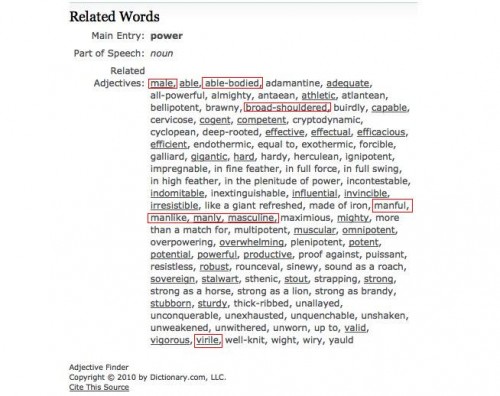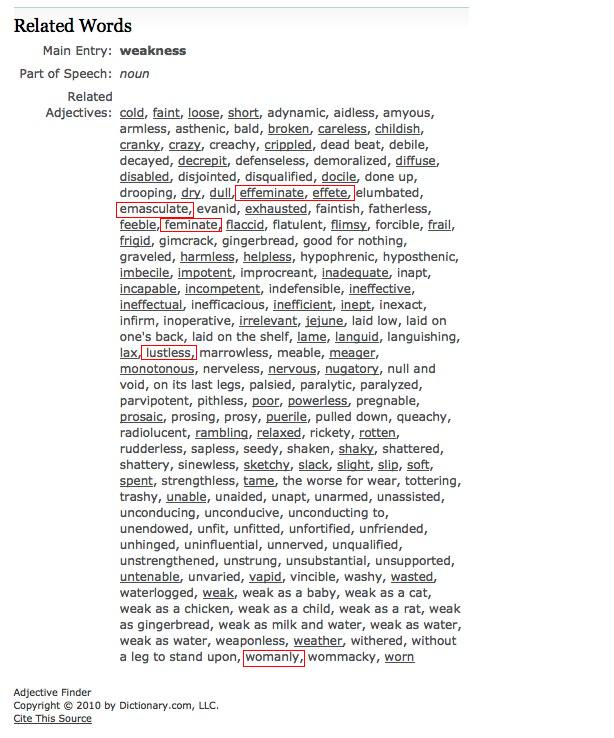Edna Sednitzer, who blogs at Red Light Politics, sent us in two screencaps of what she came across during a recent search on Thesaurus.com. She searched the word “power” and this is one of the entries that came up, for “related adjectives” (some words I found notable highlighted in red):
Out of curiosity she then searched “weakness,” and here are the suggested adjectives:
At least according to this thesaurus, masculinity is powerful, capable, competent; femininity is weak and incompetent. There’s a sexual component as well — notice that power is associated with being virile, while weakness = lustless. Of course, we also associate men and masculinity with the active pursuit of sex, while women are supposed to be the objects of pursuit, not actively sexual.
Anyway, it’s a great example of how language is gendered in a way that privileges masculinity and men over femininity and women.
Gwen Sharp is an associate professor of sociology at Nevada State College. You can follow her on Twitter at @gwensharpnv.


Comments 82
cb — July 16, 2010
I am not surprised by this at all. In high school, people were incredulous that I was in the weight room three times per week and threw shotput. Or that I could beat my brother at armwrestling. I worked in retail and people were incredulous that I could collect carts as well as the guys (I always had to volunteer for this duty, since girls were never asked to get carts). I don't know why people refuse to see a woman as physically strong, but plenty do. Oh and then if they do accept that you're strong, you're seen as undesirable. Fun.
Ben — July 16, 2010
Well, that's quite the discovery. Could it have anything to do with the fact that men are generally stronger and women are weaker, physically speaking?
softestbullet — July 16, 2010
Of course, we also associate men and masculinity with the active pursuit of sex, while women are supposed to be the objects of pursuit, not actively sexual.
Also, asexual people and people with low sex drives for whatever reason = weak.
Kit M. — July 16, 2010
I almost believe that "male" was purposefully tacked on after "power" by someone who had an axe to grind, because not only is it NOT a synonym for power, it's the only word that isn't in alphabetical order.
I'm looking at my Roget's and the entry is "Power, Potency". "Potency" has its own sexual connotations that "power" doesn't necessarily have, so the entry includes "virility" and "Viagra" (yeah). But even then, it doesn't appear to include "male" or even "masculine."
AJD — July 16, 2010
("Effete" isn't directly connected to gender—'lacking force' is its original English meaning. The fact that it has feminine connotations in present-day English is an example of the reverse of the process being pointed out here: a word that means 'weak' being treated as if it means 'feminine', not a word that means 'feminine' being treated as if it were a synonym for 'weak'. Of course, the fact that "effete" sounds similar to "effeminate" makes this association easier.)
K. — July 16, 2010
Anyway, it’s a great example of how language is gendered in a way that privileges masculinity and men over femininity and women.
I don't think this is an example of language being gendered. It's the association which isn't actually the language. After all, some of the related words are only related, not synonymous. The fact that "manly" is associated with "power" is not a fault of the language. I think the only real example is effete, according to a word note in my thesaurus "effete derives from the Latin effētus, which meant "worn out from bearing children" and thus had an obvious feminine connotation."
T — July 16, 2010
Not disagreeing with the clear Male/Female association... but I would suggest you have to be careful when jumping to conclusions by overtstating the PURPOSE of a thesaurus.
A thesaurus provides RELATED words -- not definitions.
Language is nuanced and words are not interchangeable. Each of the words on the list have a particular meaning, in particular contexts.... and X doesn't necessary mean "power" or "weakness" in a given context and may or may not be appropriate.
Lance — July 16, 2010
I don't want to dismiss the issue here, especially because I know that many people do use dictionary.com. But I think the issue here is less the language and more the compiler of this list. I mean, it includes "cryptodynamic" ("having hidden power"), a word whose web hits are primary lists of random words and someone using it as a handle on gaming forums; and "cervicose" ("having a strong neck", for pity's sake), which gets about fifty hits on Google, half of which are in Latin.
Which is to say: I don't think that this list actually reflects the way people use language. It's taken from Roget's descriptive word finder: a dictionary/thesaurus of adjectives by Barbara Ann Kipfer; you can see the tail end of the list at this Google Books link (the page with the bulk of the list isn't available for viewing). If you skim the book, a few things are clearer. First, she gives definitions, so as not to suggest that all of these words are interchangeable or equally associated; so she defines "virile" as "strong like a mature male", i.e. she explains that this word is associated with "power" for a particular reason. And second, Kipfer is engaging in a kind of free association, and some of it goes past "free" and into "insane"--so a few pages later, "cynical" and "homeless" are under the heading "Privacy". dictionary.com, a source I personally consider just slightly more reliable than urbandictionary, took Kipfer's list as it was, without thought and without the explanatory definitions. (If you look up "privacy" on dictionary.com, sure enough, there are "cynical" and "homeless" as related adjectives.)
There's a lot to be said about the way language is gendered. There's also a lot to be said about not using lousy reference works.
Sarah — July 16, 2010
Synonym for weakness = laid on one's back??
Missionary position, anyone? :)
We create language, language creates us!
jay — July 17, 2010
There was a report on CNN this week (couldn't find a link) about women in Irak not being put in combat position and therefore not being promoted. It's surprising to me that even a generic position as a soldier is treated according to his/her gender.
The biggest irony I see in your post is that men write dictionaries and women teach them to kids...
Willow — July 17, 2010
I want to point out that it's not "weakness => feminine." It's "weakness = feminate" or "effeminate".
The distinction is that feminine-ness is something that can be inherent to a female, but a male who exhibits femininity is doing something unnatural and thus it is an adopted characteristic--"effeminate."
The issue is the crossing of boundaries, not just the categories themselves.
j — July 17, 2010
emasculate is not an adjective.
“I’m not trying to be that diesel” « Elisabeth Akinwale — February 11, 2013
[...] Though I didn’t realize it at the time, in many ways I feel I was freed from the confines of stereotypical notions of femininity. I’ve always included strength as a completely normal characteristic for a woman. [...]
February 15th, 2012 | Midcoast Crossfit – Old Saybrook, CT — February 14, 2013
[...] Though I didn’t realize it at the time, in many ways I feel I was freed from the confines of stereotypical notions of femininity. I’ve always included strength as a completely normal characteristic for a woman. [...]
How to Construct the Perfect Penis! | SociologyFocus — February 20, 2013
[...] to explaining how this operates we will first explore how masculinity itself is constructed as the opposite, the repudiation, the rejection, of the [...]
How to Construction the Perfect penis! | Western Illinois University's Center for the Study of Masculinities and Men's Development — October 4, 2013
[...] to explaining how this operates we will first explore how masculinity itself is constructed as the opposite, the repudiation, the rejection, of the [...]
Is Power Equivalent to Masculinity? | AMS10 Fall 2013 -- Wednesday — October 15, 2013
[...] http://thesocietypages.org/socimages/2010/07/16/power-masculine-weakness-feminine/ [...]
Are my muscles manly? | CrossFit Barrington — November 17, 2013
[…] Though I didn’t realize it at the time, in many ways I feel I was freed from the confines of stereotypical notions of femininity. I’ve always included strength as a completely normal characteristic for a woman. […]
3 Sexist Ideas About Women's Roles That Impact the Way We Treat Them as Survivors — Everyday Feminism — May 3, 2015
[…] just one part of the way society conflates feminine characteristics with weakness and […]
Not My Problem: The Feminization of Emotional Labor – Anna Bjella — March 5, 2017
[…] to be support for higher up executives and doctors, respectively. This stems from a long, deep-seeded history of conflating femininity with weakness and also conflating emotional sensitivity with […]
Anon — September 1, 2019
Now, don't be so politically correct. Men are naturally made for being powerful and intimidating and women are made to be weak and fragile.
Opinion | Femininity is not a weakness – Indexed World News — January 23, 2022
[…] State College, discovered that when she searched “weakness” on Thesaurus.com in 2010, the related adjectives included effeminate, effete, feminate and womanly. While these related adjectives no longer appear […]
Opinion | Femininity is not a weakness – SmokeMyKush — January 23, 2022
[…] State College, discovered that when she searched “weakness” on Thesaurus.com in 2010, the related adjectives included effeminate, effete, feminate and womanly. While these related adjectives no longer appear […]
Opinion | Femininity is not a weakness – NYC Crypto — January 23, 2022
[…] State College, discovered that when she searched “weakness” on Thesaurus.com in 2010, the related adjectives included effeminate, effete, feminate and womanly. While these related adjectives no longer appear […]